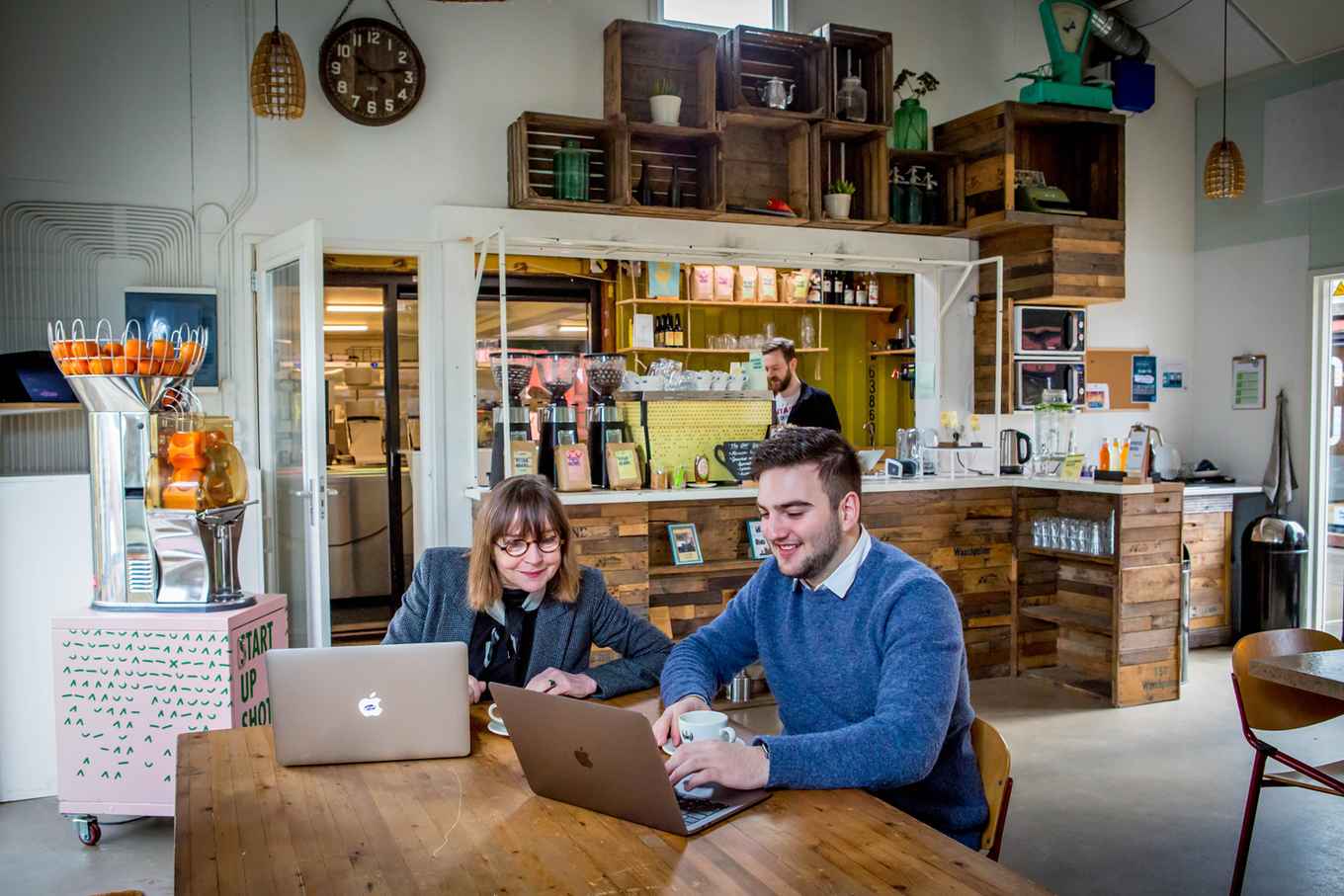20 years Faculty of Science: the past, present and future of Information Studies
28 April 2020

Text: Edda Heinsman. Fotography: Liesbeth Dingemans
'It’s such a great, inspiring place’, says Sandberg. 'The university is a bastion of conservatism; here there is scope for new ideas and innovation. There are lots of start-ups.’ Yunus points out a somewhat larger space. 'I sometimes attend a lecture in one of the three rooms that are in there.' 'And our AI lab is in there too’, adds Sandberg.
Interdisciplinarity
Just over 10 years ago the Social Science Informatics research group relocated to the science park. First to one of the matrix buildings, where they shared the building with various entrepreneurs. And then to the Nikhef, and they’re currently based in Science Park 904. 'Where you’re based impacts on your development’, says Sandberg. 'Relocating from the Roeterseiland campus to the science park gave us a different perspective; before that we collaborated far more with psychology and economics, for example. Since we’ve been in the Faculty of Science, we’ve focused far more on the technology side of things. I have mixed feelings about this. It’s good because it means that we get involved with all the research that’s going on here, but I don’t want the interdisciplinarity of our work to completely disappear.’
Indeed, it was the broad, interdisciplinary nature of the programme that attracted Demir to it. 'I really wasn’t sure what I wanted to study. I considered Media and Culture, psychology and IT. Maths isn’t really my thing. I wanted to do something that involved technology, I love computers.' During a Bachelor’s information day, Demir came across a stand on Information Science. 'I’d never even heard of the information science programme! But I was immediately inspired and, having talked to the student ambassadors, I was convinced that this was the programme for me.’ Demir now hopes that he can help other prospective students who are unsure of what they want to study. He himself has become a student ambassador and is also on the board of the study association.
Far more relaxed
How has the Faculty of Science changed over the past twenty years? 'When I started it was far easier to get funding, a grant from the European Commission had an 80% chance of success. Now, it’s only 15-20%’, says Sandberg. ‘Far more people are sharing the same pot, there’s more competition and proposals have to meet far more stringent requirements. Things used to be far more relaxed.’ Sandberg also sees positive developments: ‘Universities have become far more open to the outside world and are more aware of their social responsibility. Nowadays, sustainability is a key theme for the Faculty of Science; twenty years ago that was definitely not the case.’
According to Sandberg, significant progress has been made in the field of education too. 'As a lecturer, you can no longer simply walk into a room and think to yourself 'well now, what shall I talk about today'. More thought goes into the curriculum and into study materials and teaching methods, and assessments are better designed and documented. Sometimes, however, it goes a bit too far. Plans that were designed to make studying easier, to enable students to study in a more uniform way, can lead to an excess of deadlines. Students go into overdrive.’ Demir agrees that the curriculum is tough. 'You basically go from one deadline to the next. It would be nice if there was a bit more freedom within the curriculum’. And that’s exactly what Sandberg is working on. ‘I believe students should have more scope to make their own choices. That will require changes on both sides. We’re currently discussing this across the university as a whole.’
Open atmosphere
It looks as though it’s going to rain, so we quickly go into the coffee shop. Demir opens his laptop and shows me a photo of the board of the study association. They all look very smart in their suits, half of the board are women. 'Unfortunately, that isn’t the case in the programmes themselves’, says Demir. 'Very few women study information science, but luckily more study Information Science and Artificial Intelligence'. Demir’s work for the association brings him into regular contact with businesses in the Startup Village. ‘We organise workshops and lectures for the study association here, in conjunction with businesses. That way, people can see at first hand what the jobs market is like. It’s a really great open atmosphere. Who knows, I might end up working for one of these businesses when I graduate!', laughs Demir.
Demir can’t say much about the changes that have taken place within the Faculty of Science over the past twenty years, because he’s only 20 himself. How does he see the next twenty years? ‘Things are developing at breakneck speed. Take quantum computers or self-learning artificial systems, for example. They’re incredibly complex but they will impact on everyone’, says Demir. ‘So there’s ever more need for people who can explain these things effectively, which is where I see a role for myself. In my view, as an information science specialist, you form a bridge between techies and the rest of the world.’ Sandberg adds: ‘You need people who are highly specialised but you also need people with a broader perspective. That’s why I’m currently setting up the new Human Society and Technology programme. I believe that the idea that science stands on its own, as something that exists outside of society, will disappear.’ Sandberg points to her surroundings. ‘I believe that the partnership between the university and external partners will become ever stronger.’